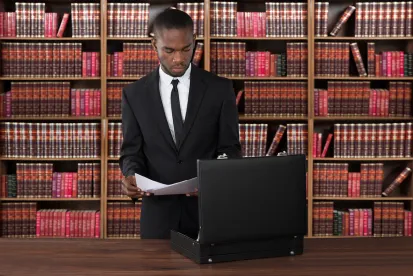Chief Justice Mark Martin has named 2018 "The Year of Legal Professionalism" in North Carolina. This proclamation will not be the only focus on the professionalism of our lawyers this year, though. Recognition of lawyers with a history of exceptional professionalism happens every year in several ways. The Chief Justice's annual Professionalism Award spotlights "individuals whose career commitments in areas such as legal ethics, disciplinary enforcements and lawyer professionalism demonstrate the high calling and higher achievement of lawyers in modern society." The North Carolina Bar Association has two similar professionalism awards. The H. Brent McKnight Renaissance Lawyer Award recognizes the "enduring influence and high ideals of the full, accomplished life of a 'Renaissance Lawyer." The Robinson 0. Everett Professionalism Award is presented to younger lawyers who demonstrate professionalism through commitment to local, state, and national bar associations. Many county and district bars also honor local lawyers who exhibit the highest standards of professionalism and legal civility. These include Wake County (the Joseph Branch Professionalism Award) and Mecklenburg County (the Ayscue Professionalism Award). And there is recognition of the more practical side of legal professionalism. For example, the North Carolina Supreme Court created the Pro Bono Honor Society in 2017 to recognize lawyers who provide at least 50 hours of pro bono legal services during a calendar year.
But when the word "professionalism" appears in a North Carolina judicial opinion, it's rarely a happy occasion.
Citations to professionalism in a court opinion generally take one of two forms. Sometimes, the Court will chastise a lawyer for straying outside the ethical rules in the context of a heated cross-examination or closing argument. Other times, the Court will detail the Disciplinary Hearing Commission's findings about a lawyer's unprofessional behavior (whether based on a specific incident or chronicling a longer period of problems).
Our courts have referred to professionalism in a positive context on a couple of occasions, though. The very first time a North Carolina court cited "professionalism" in the context of the practice of law reflected a generally favorable view of lawyers. In Shankle v. Shankle, 289 N.C. 473, 486, 223 S.E.2d 380, 388 (1976), the Supreme Court noted that a fractious family dispute with several unrepresented parties "demanded the professionalism of an attorney" (and resulted in a trial far more unpleasant than most). And the Supreme Court indirectly made a positive reference to legal professionalism in State v. Barden, 356 N.C. 316, 386, 572 S.E.2d 108, 151 (2002). In Barden, the Court noted that "the trial court complimented all counsel for the professionalism demonstrated during trial." But these are the exceptions rather than the rules. The Court of Appeals sadly reflected in Storey v. Halley, 114 N.C. App. 173, 177, 441 S.E.2d 602, 605 (1994), that "legal etiquette and professionalism are becoming more rare." It's hard to say from reading North Carolina's appellate opinions that things have gotten any better since then.
Part of this may simply be a numbers game. As more lawyers join the North Carolina State Bar (which will have licensed over 24,000 active lawyers after the next bar exam), the odds are that the overall amount of unprofessional conduct will increase as well. Part of this may also be because of the structure of the rules. Many of North Carolina's Rules of Professional Conduct are framed in the negative. "A lawyer shall not reveal information .... A lawyer shall not represent a client. ... A lawyer shall not bring or defend a proceeding ...." When the standards are prohibitive, the focus naturally falls on conduct that violates those standards.
These circumstances have not stopped courts in other states from pointing out examples of outstanding legal professionalism, though. In State v. Corleto, 161 A.3d 504, 509 n.4 (R.I. 2017), the Rhode Island Supreme Court noted the "commendable display of professionalism and candor" that the defense attorney made arguing a procedural motion. In Suter v. Commonwealth, 796 S.E.2d 416, 420 n.4 (Va. App. 2017), the Virginia Court of Appeals commended the prosecutor's "level of professionalism in honoring counsel's ethical duty of candor to this Court" during the appellate argument. And in State v. Woods, 393 P.3d 886, 889 n.3 (Wash. App. 2017), Washington's 1st Division Court of Appeals acknowledged the work of the defense attorney, who had been appointed to represent the defendant late in the process — "We extend our gratitude to Mr. Womack, who handled this unusual assignment with a high degree of skill and professionalism."
The Florida Courts of Appeal are great role models in how they address the positive side of legal professionalism. They often note in their opinions when the conduct of lawyers goes beyond mere compliance with ethics rules, and they do this in several different contexts. They recognize when lawyers have done an exceptional job representing their clients in a professional manner. See, e.g., A.J.A. v. State, 215 So. 3d 639 (Fla. 5th DCA 2017) ("We acknowledge and appreciate the professionalism with which counsel on both sides addressed the sole issue on appeal."). They point out when lawyers advise the court of information adverse to their own positions. See, e.g., Muse v. State, 23 So. 2d 763, 764 (Fla. 1st DCA 2009) ("The State having conceded the error, we note the professionalism and integrity with which the State has conducted itself in these proceedings."). They acknowledge when lawyers make the system work more effectively. See, e.g., McLean v. State, 854 So. 2d 796, 799 (Fla. 2d DCA 2003) ("The discussion among the two lawyers and the trial judge is a model of professionalism; each lawyer advocating a position while assisting the court in its effort to reach a correct decision."). They even note their appreciation when lawyers give notice that the court has made an error. See, e.g., Wood v. State, 655 So. 2d 212, 213 (Fla. 5th DCA 1995) ("We acknowledge the candor and professionalism of both counsel for bringing this to the attention of the court.").
They also recognize the professionalism of lawyers in the context of the unique role that lawyers play in society. A lawyer, among other things, is a "public citizen having special responsibility for the quality of justice."
N.C. Rules Prof. Conduct., Rule 0.1 [Preamble]. In Florida Department of Children & Families v. J.B., the Florida 3d District Court of Appeal acknowledged one lawyer's undertaking of this "special responsibility":
This court takes this opportunity to thank the Attorney Ad Litem, Angela Vigil, Esquire, for her professionalism in providing representation to J.B. on a pro bono basis. Her representation benefits the child, our community, and the courts, and exemplifies the ideals of service in our profession. By advocating the child's point of view, Ms. Vigil not only contributed an important viewpoint to aid the court's deliberation, but also enabled the child to feel that her voice was heard, considered, and respected as part of the judicial process. The child's perception that she was treated with good faith is important, our Supreme Court has noted, because "a child who feels that he or she has been treated fairly in the course of the commitment proceedings will likely be more willing to accept hospitalization and treatment."Amendment to the Rules of Juvenile Procedure, Ha. R. Jay. P. 8.350, 804 So.2d 1206, 1211 (Fla.2001)."
J.B., 154 So. 3d 479, 480 n.1 (Fla 5th DCA 2015).
Many of you will read these excerpts and think, "Well, I see lawyers doing things like that every day." You do. Trial judges often compliment the professionalism of lawyers in open court. Appellate judges often
congratulate the lawyers who appear before on having made outstanding arguments. Clients often write letters to their lawyers thanking them for the professional manner in which the lawyers handled their matters. All of this proves the nature of the problem: Lawyers know that most conduct of lawyers goes beyond the barest conformity with the ethics rules, but that's not how it looks when you read judicial opinions (or read the paper, or watch the news). Knowledge of a lawyer's commitment to the highest levels of professionalism is almost always limited to those who see and hear and experience it firsthand.
North Carolina already does a lot to recognize legal professionalism. In addition to the various awards, we are one of 16 states that has a statewide legal professionalism commission — the Chief's Justice Commission on Professionalism. Many local bars have professionalism committees and offer programs on professionalism-related issues. But we can, and should, do more, and the written works of our courts are a good place to start. North Carolina's appellate opinions hold a special place in our state's legal history as the only readily available summaries of what happens in our court system. It should be a matter of public record when our courts encounter outstanding examples of professionalism, and Florida has shown that it is not hard to make that happen. This "Year of Legal Professionalism" is a good time for our courts to start recognizing in their opinions the shining examples of professionalism they encounter all the time.




 />i
/>i

